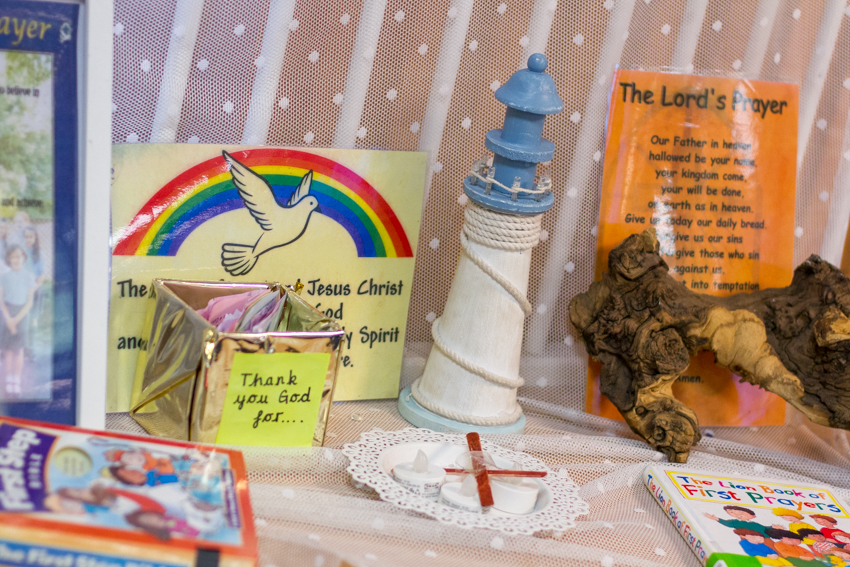Religious Education
At Bishop Martin CE Primary School our Guiding LIGHT Curriculum is built around the National Curriculum, enriched to reflect the children and community we teach.
We strive to provide a curriculum that is underpinned by our Christian Values, which are embedded in the life and work of our school, and to allow all our children to 'Let their Light Shine'.
Let Your Light Shine Before Others So They May See Your Good Deeds' (Matthew 5.16)
Intent
At Bishop Martin, we strive to be an inclusive community and Religious Education has an important and central place within our curriculum. Concepts and values are explored both through discrete Religious Education lessons and through class and whole school Collective Worship. Although Religious Education and Collective Worship naturally compliment and enrich one another, they are led and developed separately within school.
We believe Religious Education has an important place in the development of every pupil. In particular, through our Religious Education curriculum, we aim to help children to:
-
Develop an understanding of religious faith as the search for and expression of truth.
-
Enable pupils to encounter Christianity as the religion that shapes British culture and heritage and influences the lives of millions of people today.
-
Contribute to pupils' own spiritual/ philosophical convictions, exploring and enriching their own faith and belief.
-
Enable pupils to learn about the other principal religions of Britain, their impact on culture and politics, art and history, and on the life of their adherents.
Implementation
As Religious Education develops children’s knowledge and understanding of the nature of religion and belief, it provokes challenging questions about meaning and purpose, truth and values, identity and belonging. Pupils will experience, explore and encounter a wide range of creative and challenging multi-sensory activities that will help them to discover the answers to fundamental questions such as these:
-
Who am I and what does it mean to be me?
-
In what ways do/can I relate to others?
-
How/where can I encounter God?
-
How can I make a positive contribution to the world in which I live?
-
What values, attitudes, beliefs and behaviour are important to me?
-
What does it mean to have faith?
-
Who/what influences and inspires me?
Through an open investigative enquiry approach the pupils will be given the sense of being on a quest of discovery. A key feature of the syllabus is the large number of questions included in each unit. The purpose of these questions is to give pupils opportunity to investigate, reflect, evaluate and make meaning. In doing so they will discover more about themselves, their relationships with others, their relationship with the world around them and their relationship with God. The questions set the route through the curriculum content.
The curriculum content is a balance of the three essential disciplines of quality RE, Theology, Philosophy and Social Science. This means pupils will look at concepts through a theological lens, exploring what people of faith believe. Alongside this pupils will explore questions and answers raised in relation to the lived reality and impact of religion and world views on people’s lives. They will also think like philosophers, and be equipped with the skills that will enable them to make sense of life’s experiences.
Curriculum Planning
Medium term planning is provided by the Blackburn RE Scheme (Questful RE)
Each unit of work follows the same teaching and learning structure, and includes:
-
The key question for the unit of work
-
Christian concepts & values covered in the unit of work
-
Unit aims
-
Key skills covered in the unit of work
-
Key questions
-
Key vocabulary
-
Links to World Faiths
Teachers annotate their Unit Overviews and refer to them from lesson to lesson. Specific annotation will include personalised adaptations for all SEN children. Some teachers create their own PowerPoint for the lesson using the key areas listed above. Lessons are monitored by the RE subject leader to ensure coverage of the Unit Overviews. The mode of working in Religious Education depends on the nature of the unit, the class teacher and the needs of the children. Class lessons, individual and collaborative group work is evident throughout the Key Stages. In the Foundation Stage, Religious Education is assessed as part of ‘Understanding of the World’ although we use The Blackburn Diocese Syllabus to plan and deliver lessons.
Religious Education Subject Overview
*Parents/Carers have the right to withdraw their child from all or part of our RE curriculum. Any such request can be discussed with our headteacher.
Impact
We monitor the impact of our Religious Education Curriculum through:
-
Subject Leadership: Subject leaders routinely monitor the effectiveness of their subjects through pupil voice, work scrutiny and teaching and learning observations/ walks and assessment analysis.
-
A regular monitoring system, to monitor the impact of the teaching and learning of Religious Education to identify and address any next steps.
-
Prior learning and post learning activities such as retrieval practice identify any gaps in learning, giving teachers the opportunity to plan for and address specific gaps.
-
Impact tasks to again, ensure a clarity of judgement against subject end points
-
Religious Education is assessed each half term/ term.
-
Termly reports of standards across the curriculum identify strengths and next steps.
.png)
